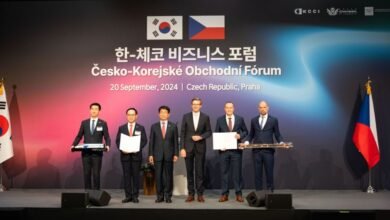SFC Energy AG and Johnson Matthey expand their strategic partnership on hydrogen fuel cells

SFC Energy AG, a leading supplier of hydrogen and direct methanol fuel cells for stationary and mobile hybrid power solutions, and Johnson Matthey (JM), a global leader in sustainable technologies, have extended their strategic hydrogen partnership with the aim of accelerating joint value creation in the fast-growing hydrogen fuel cell market.
Under this partnership, JM commits to developing and supplying proton exchange membrane components (PEMs) for the H2-PEM stack developed by SFC Energy, the core of the SFC hydrogen fuel cell. With more than 60,000 fuel cells sold worldwide, SFC is expanding its range of higher-power hydrogen fuel cells for stationary markets.
The long-term collaboration between SFC and JM has to date centered on the supply of components for SFC’s direct methanol fuel cell systems (DMFC). Now, SFC and JM have entered into a technology transfer agreement, contractually agreeing that SFC Energy will acquire Johnson Matthey’s assets and technology for the production of Membrane Electrode Assemblies (MEAs) for Direct Methanol Fuel Cells (DMFCs) at SFC’s new development and production site near Swindon, UK. Thus, SFC Energy expands its core competencies by adding DMFC membrane technology and will be able to produce the essential fuel cell components itself in the future.
In this way, SFC Energy secures a stable supply chain and significantly increases the value-added share for methanol fuel cells by integrating component production. SFC Energy will thus also take over the upcoming developments of the DMFC MEA to make processes more efficient and to implement material savings and cost efficiencies. SFC Energy plans to start series production in the fourth quarter of 2023.
In addition, both companies have entered into a long-term supply agreement in which JM commits to supply catalysts for DMFC fuel cells to SFC Energy for at least five years. In this way, SFC Energy creates price stability and secures its high-quality standards over a long-term period.
Looking to the future, SFC and JM have signed a Memorandum of Understanding (MoU) detailing their intention to work together in the field of hydrogen fuel cells for stationary applications, where PEM components will be developed under a Joint Development Agreement (JDA) with the intent that JM supplies these components for at least five years.
Dr. Peter Podesser says, “We have now been given the opportunity by Johnson Matthey to obtain assets and technology for the production of components for DMFCs. This is not something that can be taken for granted and is evidence of a strong partnership that has been in place for about 20 years. We are expanding our fuel cell competencies and will benefit greatly from the agreement with the target of cost reduction and further performance enhancement. We are pleased that Johnson Matthey will continue to be at our side. The long-term supply of catalysts for DMFC and the agreement to work on hydrogen PEM components shows that we are convinced of the quality of Johnson Matthey and will continue to rely on this proven partnership. With the agreements now in place, we will be able to master decarbonization faster and more consistently and further advance hydrogen fuel cell technology.”
Mark Wilson says: “The evolution of our partnership with SFC Energy to focus on PEM components demonstrates how our technology, manufacturing capabilities, and expertise make us ideal long-term partners for our customers. It is an important step in the implementation of our strategy.”
Hydrogen fuel cell-powered generators are an ultra-low carbon alternative to those powered by fossil fuels. They provide all the same advantages as diesel-powered generators in terms of fast start-up times and can supply a wide range of power requirements, but have zero emissions. SFC has been successfully focussing on the market for backup and off-grid power supplies for industrial, public security and private customers and has built a leading market position.
